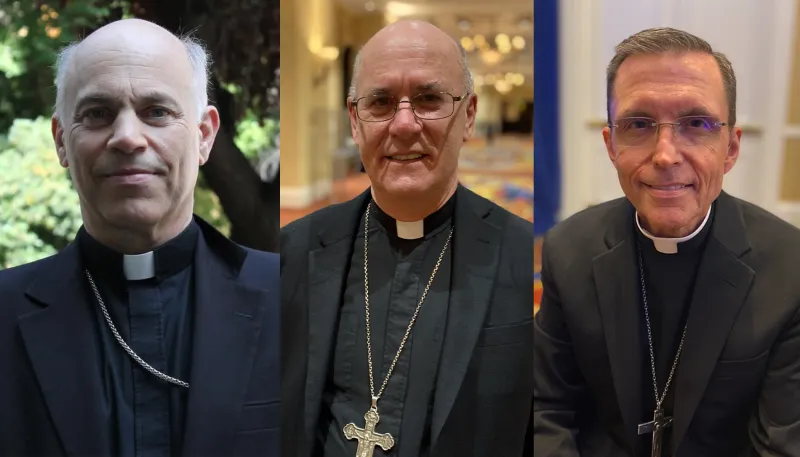
Washington, D.C. Newsroom, Nov 25, 2022 / 11:00 am (CNA).
A recent survey of priests found growing distrust of bishops and major fears that they would not get their support if faced with false abuse accusations.
Eighty-two percent of priests responding to a survey conducted by The Catholic Project, a research group at The Catholic University of America in Washington, D.C., said they live in constant fear of being falsely accused of sexual abuse.
And only 51% of diocesan priests believe their bishop would support them during an abuse investigation, according to the survey, which was released in October. Meanwhile, only 36% are confident their diocese would provide the resources necessary to defend themselves during a legal investigation.
CNA discussed those survey results with bishops attending the fall general assembly of the United States Conference of Catholic Bishops in Baltimore earlier this month. During the annual gathering, the U.S. bishops marked the 20th anniversary of the Dallas Charter protocols the conference adopted in 2002 for responding to abuse allegations against clergy.
Archbishop Salvatore Cordileone of San Francisco called the survey’s findings “very troubling,” adding that bishops must “support the priests that are having difficulties and troubles” and “be compassionate and patient with them.”
Cordileone said the possibility of career-ending accusations is even greater in some parts of the country than in others.
“Priests are under a lot of pressure, and we need to appreciate that, especially in the climate in some states, like our own (California), that once again has lifted the statute of limitations. Now everyone’s vulnerable to an accusation,” Cordileone said.
Auxiliary Bishop Robert Reed of the Archdiocese of Boston voiced his sympathy with priests’ concerns, saying that priests live with the knowledge that they are “just one accusation away from retirement” and that in many cases, “if you are accused of something, that’s pretty much the end.”
Priests’ lack of trust in their bishop contributes directly to burnout. Young priests seem particularly vulnerable, with 60% of diocesan priests under the age of 45 voicing at least some level of burnout, according to the Catholic Project survey.
Connecting with and helping individual priests feel supported is a “challenge for bishops,” Bishop Kevin Rhoades of the Diocese of Fort Wayne-South Bend, Indiana, told CNA.
“I think it is important,” Rhoades said, adding that he’s had to ask his staff for additional support “so that I can have time with the priests.”
Yet, when it comes to sexual abuse investigations, those challenges are further magnified. “You’re trying to be sensitive to the victim, alleged victim, and be there for them. Then there’s the priest,” Rhoades stated. “So it’s a really, really difficult thing to deal with, but we have to.”
To Reed, the solution to priests’ distrust of bishops is “less administration, more personal contact.” In Reed’s opinion, there “has to be a missionary aspect” of a bishop’s work. “A cup of coffee, you know, with a priest, celebrate the morning Mass, go out to dinner, maybe stay over the rectory, that kind of thing.”
Though a bishop can work hard to improve the trust with his priests, there is “nothing you really can do” about the one-and-done nature of abuse accusations, Reed conceded.
For Cordileone, it depends on the priest in question and his track record. Cordileone said that if “it’s clear that he’s innocent, and he’s been a respected pastor his whole life … (the priest’s bishop) has to protect his reputation … even despite the vitriol he’s going to receive. I think that that’s one thing that can help to rebuild trust with the priests.”
Shannon Mullen and Zelda Caldwell contributed to this story.
If you value the news and views Catholic World Report provides, please consider donating to support our efforts. Your contribution will help us continue to make CWR available to all readers worldwide for free, without a subscription. Thank you for your generosity!
Click here for more information on donating to CWR. Click here to sign up for our newsletter.





Notice: bishops get a free pass..(stika, mccarrick, etc)…. A priest is immediately removed, nowhere to go & little support…
Then these cowardly mitres leave a man in limbo or “retire” him out of fear.
Gone are the brave men of years gone by & for us priests… Have a life jacket ready, you are on your own.
It’s horrific. Even though there was an abuse case in my own family, I am convinced that the majority of allegations are completely false, just extortion schemes, and innocent priests are being thrown to the wolves, and even put in prison. My youngest son, 20 years old, has talked about a vocation since he was ten. Now, I do not want him to even consider the priesthood.
There was a time I dreamed of my son as being the first American Pope.
.
I am now glad he is going to be a Physical Therapist. He’s married and has a dog. I am not even sure I want grandchildren.
The false gospel trinity of fear, doubt, and liability sadly pervades and in many cases rules in more than one chancery. The bishops need to understand this is about much more than a meal, cup of coffee, or an occasional visit. There is a presumption of guilt woven into the fabric of much of the “safe environment” protocols. Sadly this has built an environment far from safe for clergy (priests, and deacons) and others who may be targeted while innocent. It also has fostered a mentality that makes true care and healing for all involved in actual abuse cases almost impossible.